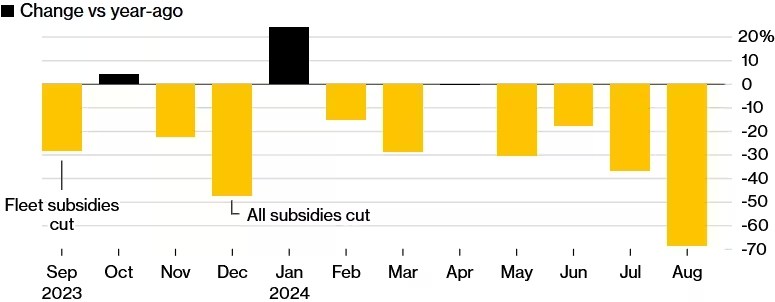ACEA calls for urgent relief measures for EU CO2 targets as EV sales collapse
20 September 2024
The European Automobile Manufacturers’ Association (ACEA) released its latest light-duty vehicle registration data, which shows that the demand for electric vehicles in the European Union continues to decline and that automakers are not on track to meet the EU mandatory CO2 emission standards. Faced with the market reality, ACEA is calling for a relief for the 2025 CO2 emission targets.
“A continuous trend of shrinking market share for battery electric cars in the EU sends an extremely worrying signal to industry and policymakers,” said ACEA in a statement. “European auto manufacturers, united in ACEA, therefore call on the EU institutions to come forward with urgent relief measures before new CO2 targets for cars and vans come into effect in 2025.”
In August 2024, EU registrations of new battery electric vehicles (BEV) declined by 39% compared to the last year. In Germany, where government incentives for electric vehicles were removed at the end of 2023, BEV sales in August declined by 69% year-over-year.

(Chart: Bloomberg; Data: ACEA)
The overall EU car sales are around 18% lower than pre-pandemic levels in 2019, according to ACEA data. The market decline is affecting many brands, including and beyond ACEA members, across the board.
“As a result, the zero-emission transition is highly challenging, with concerns about meeting the 2025 CO2 emission reduction targets for cars and vans on the rise,” ACEA warned. “This raises the daunting prospect of either multi-billion-euro fines, which could otherwise be invested in the zero-emission transition, or unnecessary production cuts, job losses, and a weakened European supply and value chain at a time when we face fierce competition from other automaking regions.”
In 2025, EU car manufacturers are required to reduce fleet average CO2 emissions by 15% from the 2021 levels. While the exact emission targets for each manufacturer depend on the vehicle mass, the current fleet average target of 115.1 g/km (WLTP) will decrease in 2025 to 93.6 g/km, according to an analysis by Dataforce. The penalty for exceeding CO2 targets are very significant—€95 per each gram of CO2 over limit per each passenger car.
ACEA has also urged the European Commission to bring forward the CO2 regulation reviews for light-duty and heavy-duty vehicles, currently scheduled for 2026 and 2027 respectively, to 2025.
Source: ACEA